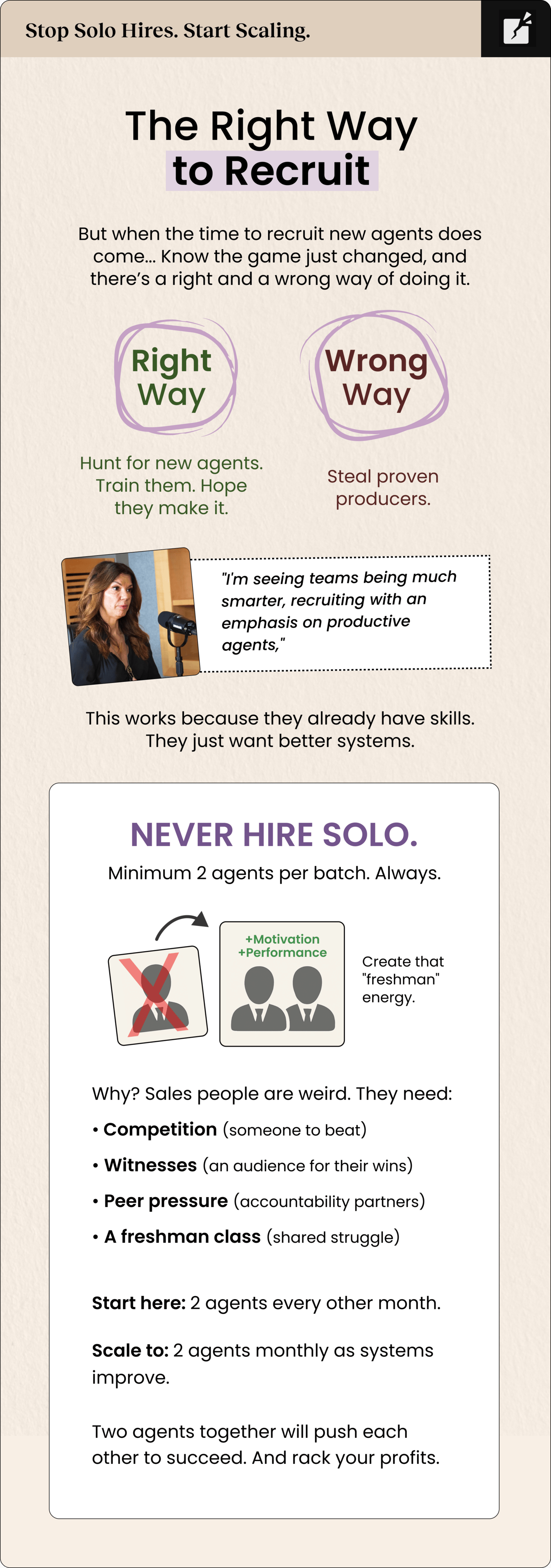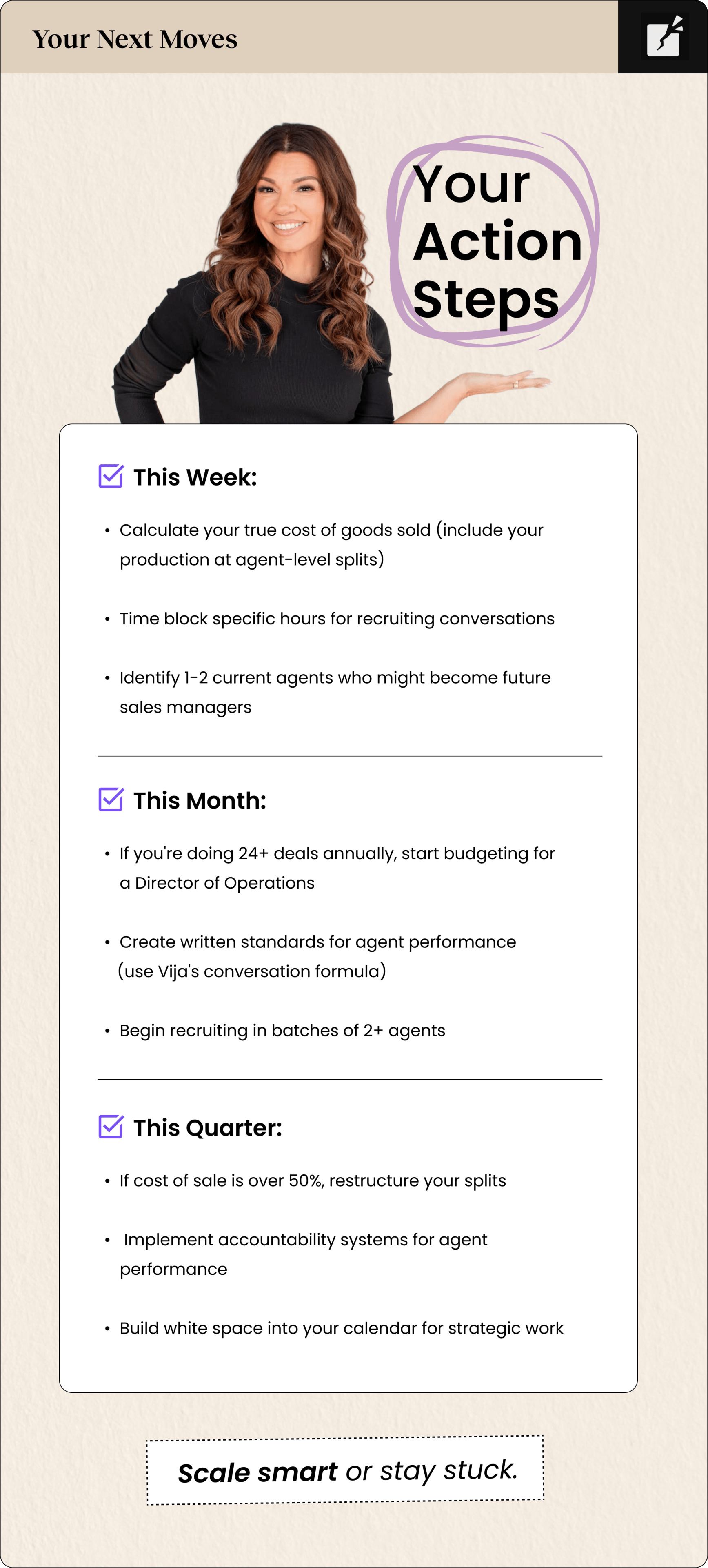Vija built her $70M business in a few years, but then in less than 4 months, her entire team left…
"I didn't notice that my entire team basically left," she told me. "I felt abandoned."
Most people would quit. But, Vija got curious.
Today, she's Head of Industry at Place, coaches thousands of top-performing teams nationwide, and has rebuilt her entire operation.
You'll learn:
Why the "messy middle" kills teams
How you are working for free
How to hire to scale your team
Why productive agents are finally joining teams
Let's see what she learned.
— Andrew


THE MESSY MIDDLE TRAP
If you're a team leader or want to be one, imagine this. You're recruiting. You're in production, and keeping everyone else productive.
Vija calls this "the messy middle", and it's where most teams die.
Here's the trap:
You're still closing deals (30-50% of team production)
You're recruiting constantly (agents always leave)
You're the productivity engine (without you, nothing happens)
That’s three full-time jobs. One person. Recipe for disaster.
So what do most leaders do? They stay small. Keep it to 15-20 agents max. Avoid the "chaos" of bigger teams.
But the truth is, this is actually the hardest way to run a team.
At 20 agents, you touch everything. At 200 agents, you have systems.
The escape route? Build these four key system:
90-day agent launch program (someone else runs it, not you)
Pod structure (10-12 agents per sales manager maximum)
Director of Operations (handles all the chaos you currently touch)
Time-blocked recruiting calendar (2+ agents every other month, systematically)
Build systems, not bigger to-do lists.
And these systems help with more than just your time and workload.

The reason this happened is because Vija believed staying small meant staying safe.
But the messy middle isn't safer. It's where dreams go to die.
YOU ARE WORKING FOR FREE
Here’s something you DON’T want to hear:
99.9% of teams are bleeding money.
The reason? Agent splits.
Vija's golden rule:
Total agent splits (including yours) = 50% max.
That's it. No exceptions.
$10,000 commission → $5,000 to agent → $5,000 to team.
Simple enough, so why does everyone screw this up?
Because most team leaders put 100% of their production into the business, then pay themselves a salary. This creates a spiral of lost money.
For example:
Team does $5M in volume
Leader contributes $2M personally
Leader takes $0 commission, pulls $150K salary
Books show 65% to agents
Reality: You're working for free
Your work matters! So pay yourself the same split as your agents. Force yourself to see the real numbers. Lead by example.
"If you're at 65% cost of sale, you're at a 15% margin," Vija warns. "You're basically working for free."
THE RIGHT WAY TO RECRUIT

THE THREE LEADERSHIP RULES
When it comes to managing those people, Ben Kinney taught Vija the "3 fiduciaries of a leader." Master these and everything else gets easier:

1. Set standards and expectations (upfront and often)
Define exactly what success looks like.
"Most of our agents wouldn't answer that way," Vija admits. "And I'm not saying I've always won there either, but we do need to aspire to that."
2. Inspect what you expect
Have accountability systems built in
Avoid "seagull management" (poop and fly away)
Create tracking, measurement, and follow-up processes
3. Provide an environment to succeed
Physical space, technology, training, culture
Remove barriers to agent success
Support the standards you've set
"If I walked up to your agents and said, 'What is the standard for your role?' would they be able to answer?"
Make sure the answer is yes.
THE WHITE SPACE SECRET
And all this is a lot of work, but you can’t take it too far.
Billion-dollar CEOs don't fill their calendars.
Ben Kinney runs Place (valued at $1-2 billion) and his calendar is half-empty!
"He leaves room for reaction, for opportunities, for white space, for thinking."
People think: busy calendar = important person.
But the billion-dollar reality is an empty calendar = power.
Because a packed schedule means no room for:
Lead generation calls
Game-changing opportunities
Strategic thinking
Growth activities

WANT THE FULL STRATEGY?
Search #1 Team Expert: I've Coached 400+ Real Estate Teams & This KILLS PROFIT on YouTube or your favorite podcast app to watch the complete episode now!



